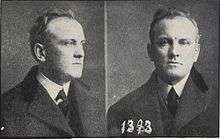Pat Crowe
| Pat Crowe | |
|---|---|
|
Crowe's arrest photo in Butte, Montana, United States | |
| Born |
Pat Crowe 1869 Iowa, United States |
| Died |
1938 (aged 68–69) Harlem, New York City, New York, United States |
| Cause of death | Heart attack |
| Nationality | American |
| Other names | Frank Roberts |
| Occupation | Criminal, speaker, writer |
| Criminal charge | Bank robbery, train robbery, kidnapping |
| Criminal penalty | Six years in Joilet prison |
| Criminal status | Served |
| Spouse(s) | Hattie Murphy (separated) |
| Children | None |
| Conviction(s) | Larceny |
Pat Crowe (1869–1938), also known as Frank Roberts,[1] was an American criminal who was implicated in the 1900 kidnapping of Edward Cudahy, Jr. in Omaha, Nebraska. He later became a lecturer and writer.
Crowe's criminal notoriety as a bank and train robber and as a kidnapper gained him fame across the United States when he began writing and speaking about his exploits in the early 20th century. According to Time magazine, Crowe's "misdemeanors began with robbing Omaha streetcars in 1890 and included a diamond theft, homicidal attempts, a visit to and escape from Joliet prison, hold-ups and pilfering on railroads".[2]
After his last acquittal in the Cudahy trial, the Omaha Daily News described him as "one of the few really spectacular and truly named desperadoes" of the day,[3][4] while an obituary called him, "one of the most colorful figures in American criminal history".[5]
Today, his written personal narratives of the Cudahy story are studied for their authenticity.[6]
Early life and criminal career
Crowe was born on a farm outside Davenport, Iowa, and had 11 siblings. Soon after he turned 13 his mother died, and Crowe moved to South Omaha, Nebraska, a new town centered on a growing meat packing industry. Along with a partner named Pat Cavanaugh, Crowe opened a butcher shop in the area at age seventeen. Soon after, his shop was closed by the large operation owned by Edward Cudahy. He was hired by the Cudahy Meatpacking Plant shortly thereafter. Cudahy fired Crowe after he was caught stealing money from the operation.[7]
Crowe held a variety of jobs and committed small crimes until the early 1890s. Using the alias Frank Roberts, Crowe perpetrated a variety of crimes. After being detained by police in a pawnbroker's shop in Chicago, Crowe got in a gunfight with police. He was arrested and sentenced to six years in the Joilet prison for the gunfight and the alleged attempted robbery of the pawnbroker's shop.[8] However, he did not serve this entire sentence: Governor Fifer pardoned him after having only served seventeen months.[8] In 1897, Crowe, again as Roberts, was sent to trial in Denver, Colorado, for burglary and larceny of a jewelry store. However, he jumped bond and was never tried.[9]
Crowe resurfaced in South Omaha around 1900 with his old comrade Pat Cavanaugh. That winter they kidnapped Edward Cudahy, Jr. After scoring the first successful ransom for a kidnapping in the United States, Crowe disappeared, resurfacing a number of times[10] until 1905.[11] That year, he walked down the streets of Butte, Montana, asking to be arrested for the kidnapping. In February 1906, despite the prosecution's 40 witnesses, a firsthand account of a confession to a priest, and no testimony by his defense, Crowe was acquitted by a jury.
After the kidnapping
After his acquittal, Crowe was not implicated in any more crimes. He wrote two autobiographies, in both of which he admitted his responsibility for Cudahy, Jr.'s kidnapping. In 1927, a biographer wrote Crowe's life story, portraying him as "a modern-day Robin Hood".[12]
In 1920, Crowe ended up at The Salvation Army in New York City, New York, working as a nightwatchman at the Hut in Manhattan's Union Square.[13]
Crowe died of heart disease in poverty in Harlem, neighborhood of New York City in 1938.[14]
Bibliography
- Koblas, John (2006). The Last Outlaw: The Life of Pat Crowe. North Star Press of St. Cloud, Inc.
- Regan, Thomas (1927). Spreading Evil: Pat Crowe's Autobiography. Branwell Company.
See also
References
- ↑ "Pat Crowe: 1921". Shorpy.com. Retrieved October 20, 2010.
- ↑ "Miscellany". Time. February 1, 1926. Retrieved October 20, 2010.
- ↑ "1906 Kidnapping". NebraskaStudies.org. State of Nebraska. Retrieved October 20, 2010.
- ↑ "Cudahy Kidnapping", Nebraska State Historical Society. Retrieved 10/20/10.
- ↑ Daily Mail. Hagerstown, Maryland. October 31, 1938.
- ↑ "All Things Made New". University of Virginia. Retrieved September 25, 2007.
- ↑ Galluzzo, J. (2005) When Hull Freezes Over: Historic Winter Tales from the Massachusetts Shore. The History Press. p. 92.
- 1 2 Crowe, Patrick (1927). Spreading Evil. The Branwell Company.
- ↑ The Jewelers' Circular and Horological Review. Volume 34. May 19, 1897. p 16.
- ↑ (December 12, 1904) "Elusive Suspect Escapes from Federal Detectives". St. Paul Globe.
- ↑ Galluzzo, J. (2005) When Hull Freezes Over: Historic Winter Tales from the Massachusetts Shore. The History Press. p. 97.
- ↑ Galluzzo, J. (2005) When Hull Freezes Over: Historic Winter Tales from the Massachusetts Shore. The History Press. p. 98.
- ↑ Social News. January 1920. p. 6.
- ↑ (November 7, 1938) "Milestones". Time. Retrieved October 29, 2010.
